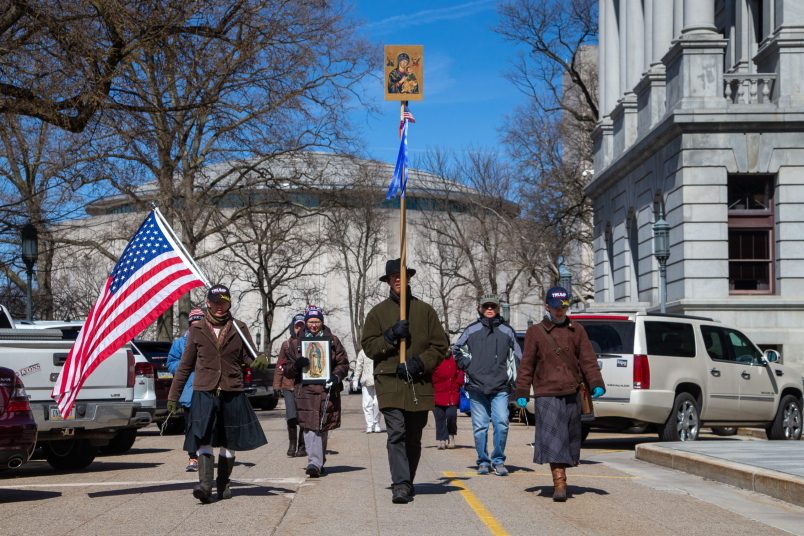More than half of Republicans support Christian nationalism and believe the United States should be a strictly Christian nation — that’s according to a new survey from the Public Religion Research Institute and the Brookings Institution.
Christian nationalism is an extreme and divisive worldview rooted in the belief that the U.S. is an inherently Christian nation and that the country’s laws should be rooted in Christian values.
The view has been prominent in white evangelical spaces for decades, but it gained significant national attention following the Jan. 6 attack on the Capitol and throughout the Trump presidency. Now, according to researchers — who surveyed more than 6,000 Americans — the public’s view on Christian nationalism is divided mostly along political party lines.
The survey found that most Republicans surveyed view themselves as either Christian nationalist sympathizers (33%) or adherents (21%). While most Democrats lean toward rejecting Christian nationalism, with 36% of them indicating they are skeptics of the ideology and 47% saying they reject it.
In fact, Republicans are about four times as likely as Democrats or independents to identify as adherents of Christian nationalism, according to the survey.
As its popularity among Republican voters has grown in recent years, some far-right lawmakers have been embracing Christian Nationalism more publicly.
Last August, during an interview at a Turning Point USA event, Rep. Marjorie Taylor Greene (R-GA), said GOP leaders need to be more responsive to Christian nationalists, which she claimed is the base of the Republican party.
“We need to be the party of nationalism,” Greene said. “I am a Christian and I say it proudly, we should be Christian nationalists.”
But surveyors found that despite its popularity among Republicans, Christian nationalism remains unpopular nationwide.
Only 10% of Americans surveyed in total view themselves as adherents of Christian nationalism and around 19% said they sympathize with these views, according to the PRRI and Brookings study. That’s a stark difference from the 21% of Republicans who say they are adherents and 33% who say they are sympathizers.
The idea has been prominent within certain American demographics, especially since the rise of the Christian Right in the 1970s. The ideas grew in popularity mostly in reaction to changing demographics and cultural and generational shifts in the U.S, Kristin Kobes Du Mez, a history professor at Calvin University, told NPR. According to Du Mez, as the country has become less white and Christian, the adherents want to hold on to their cultural and political power.
The survey supports her theory.
Researchers found that half of Christian nationalism adherents and nearly 4 in 10 sympathizers said they support the idea of an authoritarian leader in order to keep Christian values in American society.
Those who identify with Christian nationalism also believe that being Christian is an important part of being “truly American.”
So, unsurprisingly, researchers found that supporters of Christian nationalist views often hold anti-Black, anti-immigrant, antisemitic, anti-Muslim and patriarchal views as well.
For example, 72% of white Christian nationalism adherents agreed with the statement “the values of Islam are at odds with American values and way of life.” Similarly, 85% of white Christian nationalism adherents agreed that “the American way of life needs to be protected from foreign influence.”



